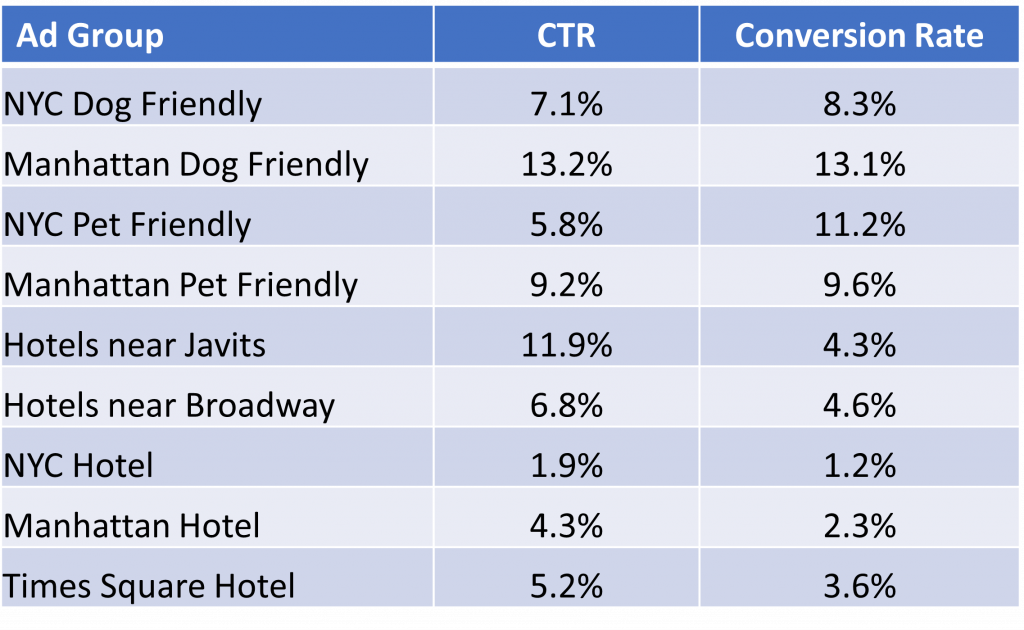The story around RSAs (responsive search ads) is fantastic. You should add several keywords to an ad group and then write an ad with a variety of assets. The magic of Google Ads will then create ads in real time to find what overall combination of assets works best for your account for that specific search.
While this story sounds great, with poor ad group organization, the story can quickly fall apart. Proper ad group organization should not be neglected as you create and test RSAs.
For example, here are the keywords and RSA assets in an ad group for a hotel based in New York City.
This advertiser expected that if someone searched for NYC dog friendly hotel, Google would show the dog friendly asset and that if someone searched for Broadway theatre hotels, the Broadway theatre hotel asset would show in the ad.
If we expect Google to serve ads in this manner, then we would also expect to see a similar number of impressions for the RSA asset that is paired with each keyword.
Unfortunately, that did not happen. Despite the NYC dog friendly hotel (their top converting keyword) keyword being by far their most searched for term, the dog friendly asset has less than 25% of the impressions compared to the keyword. In addition, that asset was also displayed with other keywords, such as Hotels Near Javits.
This single ad group had an OK CTR and Conversion Rate.

After seeing the analysis of the keyword and RSA asset data, they decided to reorganize this single ad group into several ad groups. Each RSA was customized with assets for a small, specific set of keywords. Here are the results of the reorganization:

Their conversions almost quadrupled from pairing RSA assets to their specific keywords. While this is an extreme example, we’ve seen many cases of 50%-100% improvement in conversions by ensuring that RSA assets are paired correctly with the keywords in the ad group.
RSAs can be effective, especially when using a combination of pinning and RSA testing. However, a properly organized ad group can dramatically increase your overall CTRs and conversion rates while lowering your CPAs. RSAs have not changed the way ad groups should be structured.
RSAs give you more options for ad serving, but it is called an ad group for a reason. The ad is what the user sees. Your keywords determine which specific ad should be displayed. When your keywords and ads are relevant to each other, then you have an effective ad group. The assets in your RSA should be relevant to all the keywords in the ad group.
The next time you’re improving your RSAs, look at the keywords in your ad group and compare them to your assets. If you see mismatches, you should create more granular ad groups to ensure your RSAs are properly paired with your keywords so that RSAs can perform well for your account.
Thank you again for some good insights.
We work in Sweden (small market) so to solely rely on Google automation was a disaster from day 1.
I’m curious if the automatic matching gets better after you have had a better grouping for a while. so there is data on the success of the assets + keywords?
In that case, you would first pin and segment but when you have enough data you can combine assets again in fewer ad groups and keep relevancy to be able to have more data in each ad group.
Great! Thank you Brad! I will read that blog post again, I realized I only skimmed through it last time! My bad! 😄
Insightful and hope you keep sharing such wonderful information with us
Hi Brad,
Excellent article. Thanks for sharing that,
I am your long time fan. I have purchased and read your book advanced google ads (both 2nd and 3rd edition) a couple of years ago. It has truly given me in-depth learning that I still cherish in my career. No other book I have yet found as detailed over google ads yours.
Can I request you to write one more book over the latest development of google ads? I will be the first purchaser for sure. 😀
Can you also recommend me some good books I should read being in google ads since a decade and continue expected to be on it for another decade?
Awesome. This is pretty helpful. 🙂